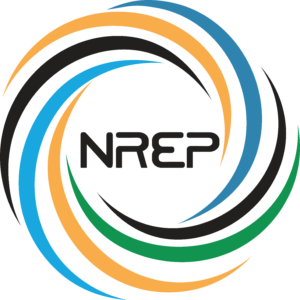On August 29, 2025, the National Renewable Energy Platform (NREP) hosted a follow-up Clean Cooking Champions Training Workshop at Adit Mall in Mbarara City. This session reconnected with 37 community champions who had first been engaged during the BCCeC Project Outreach Campaigns in March 2025. These individuals, drawn from various communities in Mbarara, had committed to serving as grassroots advocates for electric cooking technologies.
The workshop formed part of the ongoing BCCeC project, funded by the UK government through the Modern Energy Cooking Services (MECS) programme and implemented by NREP on behalf of the Ministry of Energy and Mineral Development (MEMD). Its mission is to build lasting momentum for clean cooking communication and adoption across Uganda.
Participants included a diverse mix of teachers, reverends, farmers, business owners and local leaders, each bringing unique influence and reach within their communities. Since the initial outreach, many champions had already embraced electric cooking, citing firsthand benefits such as reduced cooking costs and significant time savings, especially when using electric pressure cookers (EPCs).
This follow-up training was designed to deepen technical understanding, uncover individual strengths and assess the support needed to empower champions to lead clean cooking advocacy in their respective areas. By equipping them with practical knowledge and reinforcing their role as change agents, the workshop reaffirmed their commitment to driving sustainable energy transitions at the grassroots level.
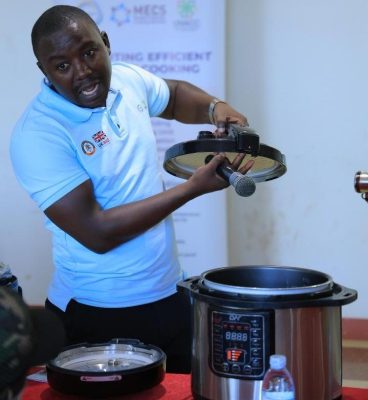
Key Highlights & Observations
Several champions shared testimonies about the transformative impact of electric cooking since applying lessons from the initial stakeholder engagement. One participant reported a dramatic reduction in monthly household fuel expenses, dropping from UGX 100,000 spent on charcoal to just UGX 35,000 on electricity. Others emphasized the time-saving benefits, noting that electric pressure cookers (EPCs) have allowed them to reallocate time previously spent on cooking to more productive activities.
The workshop featured more peer-to-peer experience sharing, where champions shared powerful narratives on how clean cooking had transformed their homes, health, and daily routines. Ms. Crescent Kisembo, a participant, recounted how she used to experience frequent sneezing and nasal irritation whenever she lit a charcoal stove. Since switching to an EPC, she no longer suffers from smoke-induced allergies, describing the change as a major relief and a boost to her overall well-being.
Localizing Communication.
To support champions in effectively engaging their communities and breaking down communication barriers often caused by the dominance of English, participants proposed a total of nineteen slogans in the Runyankore language to brand and personalize their outreach campaigns. These locally crafted slogans aim to resonate more deeply with target audiences, making clean cooking messages more relatable and impactful. Below are some of the slogans proposed by the champions:
- Okuteeka komurembe, loosely translating to “modern cooking”
- Enteeka nungi Amagara marungi, loosely translating to “good cooking, good life/health”
- Okuteeka Orikwejunisa obwire bukye, loosely translating to “cooking that saves time”
- Okuteeka kwa hati nokwa Doti com, loosely translating to “The cooking of now days is cooking of the dot com era”
- Okuteeka okwamuntido, loosely translating to “Quality Cooking”
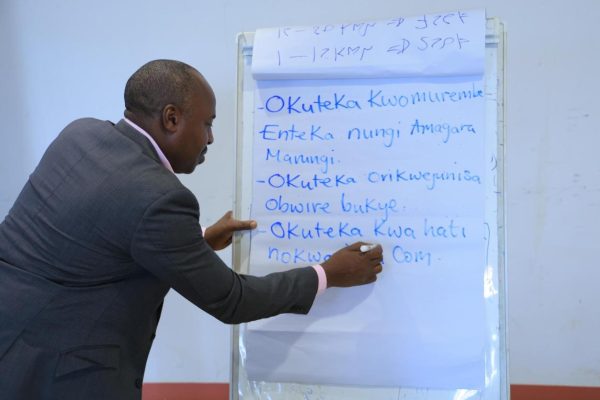
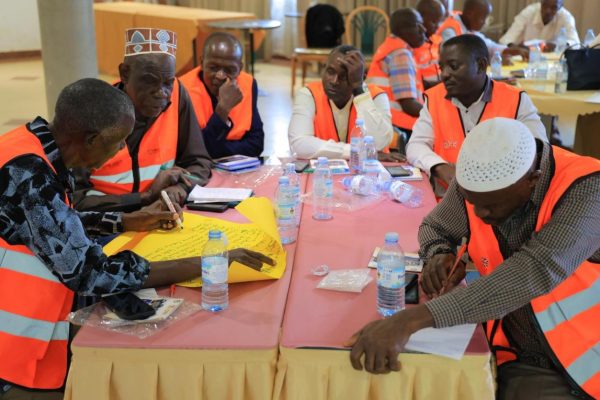
Key Highlights & Observations
As part of the training, participants learned how to craft compelling, audience-focused stories built around a clear problem, a viable solution, tangible impact, authentic voice, and the emotions of the protagonist. They were encouraged to localize their narratives and draw from real-life experiences to ensure the stories resonated with their communities. In a practical exercise, the champions worked in small groups to create a one-minute persuasive story aimed at convincing someone to adopt clean cooking as their primary cooking method or fuel, then presented these stories to the wider audience, where they were scored against the agreed criteria for a compelling story.
From Michael Karetwa’s reflection on breaking gender roles through modern cooking, to Juma Mrisho’s reminder that both urban and rural families struggle with traditional cooking methods, each story carried a relatable and emotional core. Other powerful accounts, like that of a mother who reclaimed her health and business, and Deus Byakumanya’s community transformation following a child’s illness, clearly illustrated an understanding of the subject matter by the champions.
Front-runner Efforts
Following the initial stakeholder engagement, during which champions were introduced to clean cooking initiatives, many participants began advocating for the cause within their spheres of influence. Their early efforts have already yielded promising results, reflecting a deep commitment to promoting clean cooking at the grassroots level. Below are some of the success stories they’ve shared:
- School Storytelling: One champion’s testimony at her school led to three teachers purchasing EPCs.
- Family Demonstration: A cooking demo during a family event by one of the participants resulted in multiple EPC purchases.
- Friends’ Engagement: A male champion hosted a casual weekend meal, which ended with several of his friends becoming EPC users.
These grassroots, champion-led efforts are a testament to the power of storytelling and peer influence in promoting clean cooking. As Dr. Mukisa noted, “Clean cooking is not just about technology – it’s about changing lives.” By combining authentic stories with real-time demonstrations, Clean Cooking Champions are becoming both educators and sales influencers—paving the way for a cleaner, healthier, and more connected future.
Endorsement from the City Leadership
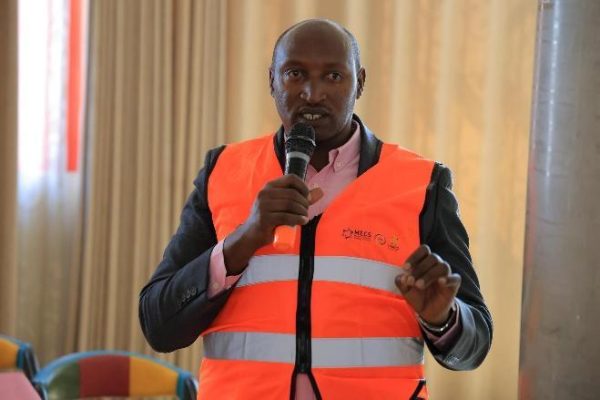
Mr. Dickson Katwaza, the Resident City Commissioner in Mbarara City, commended NREP for empowering Clean Cooking Champions with practical storytelling and outreach skills. He emphasized that clean cooking is not just a health issue, but a key driver of social, environmental, and economic transformation. The RCC assured participants of his office’s full support and encouraged champions to seek assistance whenever needed. He praised the impact of personal stories in inspiring behaviour change and urged continued momentum in promoting Electric Pressure Cookers (EPCs) across communities. He concluded by expressing hope that the clean cooking campaign will grow stronger and reach every household.
Key Challenges & Lessons Learned
During the Q&A session, Mentimeter was used to display live poll results on screen, which then guided an open discussion. Participants identified several factors affecting the adoption of Electric Pressure Cookers (EPCs), including:
- High upfront costs
- Limited awareness about EPCs
- Persistent myths and misconceptions about electric cooking.
- Concerns about electricity reliability hindering meal preparation.
- Need for larger EPC models for big families and institutions
- Lack of trust in loan or installment plans
- Negative cultural habits and perceptions about food taste
- Skepticism toward free distribution models due to risk of resale resulting from no sense of ownership.
Data privacy concerns using national IDs as collateral. Where Dr. Mukisa cautioned participants against this practice as it is illegal.
These insights highlight the need to build trust in financing options, address cultural perceptions, ensure product sizes meet household needs, and improve awareness through targeted outreach. The champions were each given a copy of the “Tips to Choose and Use Your Electric Pressure Cooker” handbook, to dispel some of the myths and misconceptions but also aid the champions in fostering behavioral change among their target audiences.
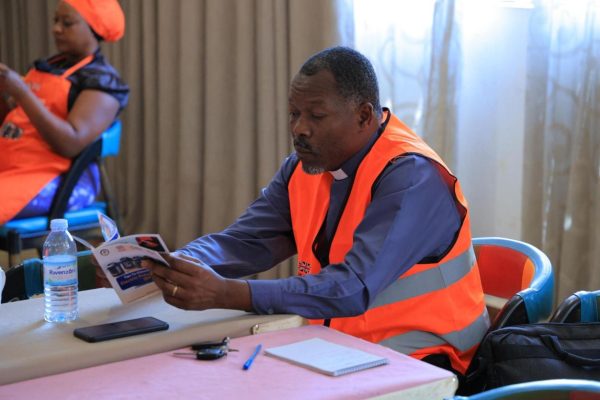
Conclusions & Next Steps
Conclusions
The Clean Cooking Champions engagement showcased the power of storytelling, peer influence, and community-driven outreach in promoting Clean Cooking, with a focus on Electric Cooking (EPCs). Champions shared personal experiences highlighting the health, economic, and time-saving benefits of clean cooking. While challenges such as high costs, misinformation, and limited awareness persist, practical solutions like group purchases, live demonstrations, and localized messaging are proving effective. With the backing of the local government, particularly from the RCC’s office, localized messages and strengthened commitment, champions are equipped to inspire change in their communities.
Through collaboration, tailored financing options, and sustained community engagement, champions are well-positioned to lead the transition toward healthier, more efficient, and environmentally friendly cooking practices across Uganda.
Next Steps
Following the conclusion of the workshop, the participants are formally recognized as fully fledged clean cooking champions. A dedicated WhatsApp group will be established to facilitate coordination and peer support. The champions are now equipped and ready to apply the lessons learnt to create awareness of clean cooking at the grassroots level.
The National Renewable Energy Platform (NREP) will continue to provide support where needed, including technical guidance during outreach activities and documentation of their efforts to ensure visibility, learning and impact analysis.


